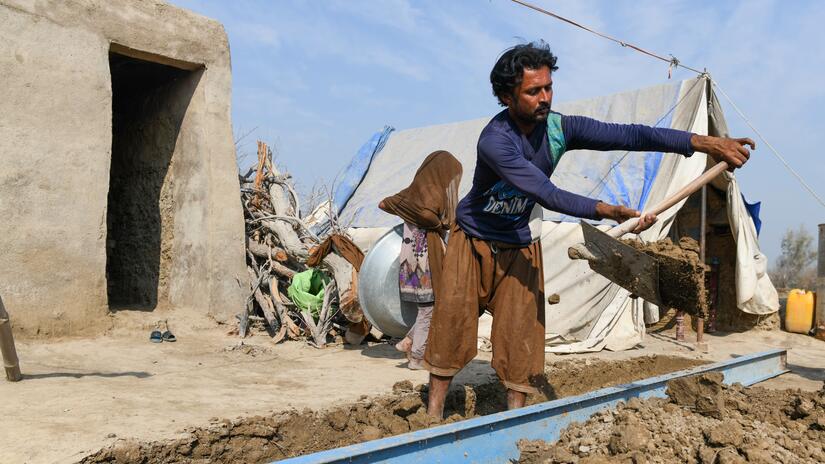Islamabad/Sindh, 28 February 2023 – The need for longer-term economic support for people who lost their homes, livelihoods, and livestock across Pakistan due to the catastrophic floods six months ago becomes pressing amid global and local economic turndown, the International Federation of Red Cross and Red Crescent Societies (IFRC) warns.
In order to address the flood’s impact, the IFRC and Pakistan Red Crescent Society have launched cash and voucher assistance to meet the urgent needs of the people most at-risk, delivering more than CHF 420,000 to 5,600 families so far. This cash assistance will enable families to meet their immediate needs, such as food, livelihood, and other essential needs.
“We understand that needs are still immense in the aftermath of the severe floods, and they will remain like this for a while as the damage is massive. We are supporting communities with cash, but it’s important to acknowledge that this aid is a short-term bridge for urgent needs. Escalating inflation and a stagnant economy don’t allow the cash to stretch as far as people need,” Peter (Piwi) Ophoff, head of the IFRC delegation in Pakistan, said. “Longer term cash support to people impacted by these devastating floods will stimulate local markets, which can help economic recovery,” Ophoff added.
From June to August last year, extreme monsoon rainfall submerged one-third of Pakistan, affecting 33 million people across the country. The monsoon floods ravaged a staggering 2.2 million houses leaving hundreds of thousands of people homeless. Families were forced to take refuge on roadsides in makeshift shelters when the country’s main Indus River burst its banks across thousands of square kilometres. The IFRC's emergency appeal has reached almost 1.3 million people with relief items, shelter, health, water, sanitation, hygiene kits, and multipurpose cash assistance over the past six months.
Pakistan Red Crescent Society has the capacity and knowledge to assist disaster-affected populations through cash and voucher assistance, a dignified, reliable and efficient ways using a swift disbursement mechanism.
Pakistan Red Crescent Society chairman, Sardar Shahid Ahmed Laghari remarked:
"There are still millions of people on the ground who are looking for help, and we need support from national as well as international communities to help as many lives as possible so that they can meet their urgent needs and resume their livelihoods in a way that maintains dignity, freedom, choice and respect," Laghari said.
IFRC’s multipurpose cash transfer program aims to help the affected people to rebuild their lives. But the skyrocketing inflation rates only add to the already volatile situation. To survive through this, continued support is required for the emergency appeal launched in September, as it is still underfunded even after six months.
The devastating floods that heavily damaged residential properties, infrastructure, and other assets, led over a million livestock to perish and left large swathes of agricultural land uncultivable, resulting in the exponential loss of income and livelihoods for millions of people. The damage created due to floods exacerbated by climate change pushed already economically disadvantaged communities further towards poverty, making the available aid fall short of meeting the increasing needs of people amid an economic recession.
Responding to the acute needs of people affected by the 2022 floods within the first six months, the IFRC emergency operation is now shifting its focus to meeting the longer-term recovery needs of affected communities. To achieve this, the main priorities include reinforcing access to safe water and sanitation facilities, rehabilitating basic health units, and launching livelihoods and multipurpose cash assistance programs.
Cash assistance is one critical approach that helps responders better put the needs and capacities of affected people at the heart of humanitarian action. It enables communities to decide how to cover essential needs like rent, transport, bills, food, and medicine.
For more information, please contact:
In Islamabad:
Irem Karakaya, +92 308 555 0065
Sher Zaman, +92 304 103 0469
In Kuala Lumpur: Afhrill Rances, +60 19 271 3641
In Geneva: Jenelle Eli, +1 202 603 6803





